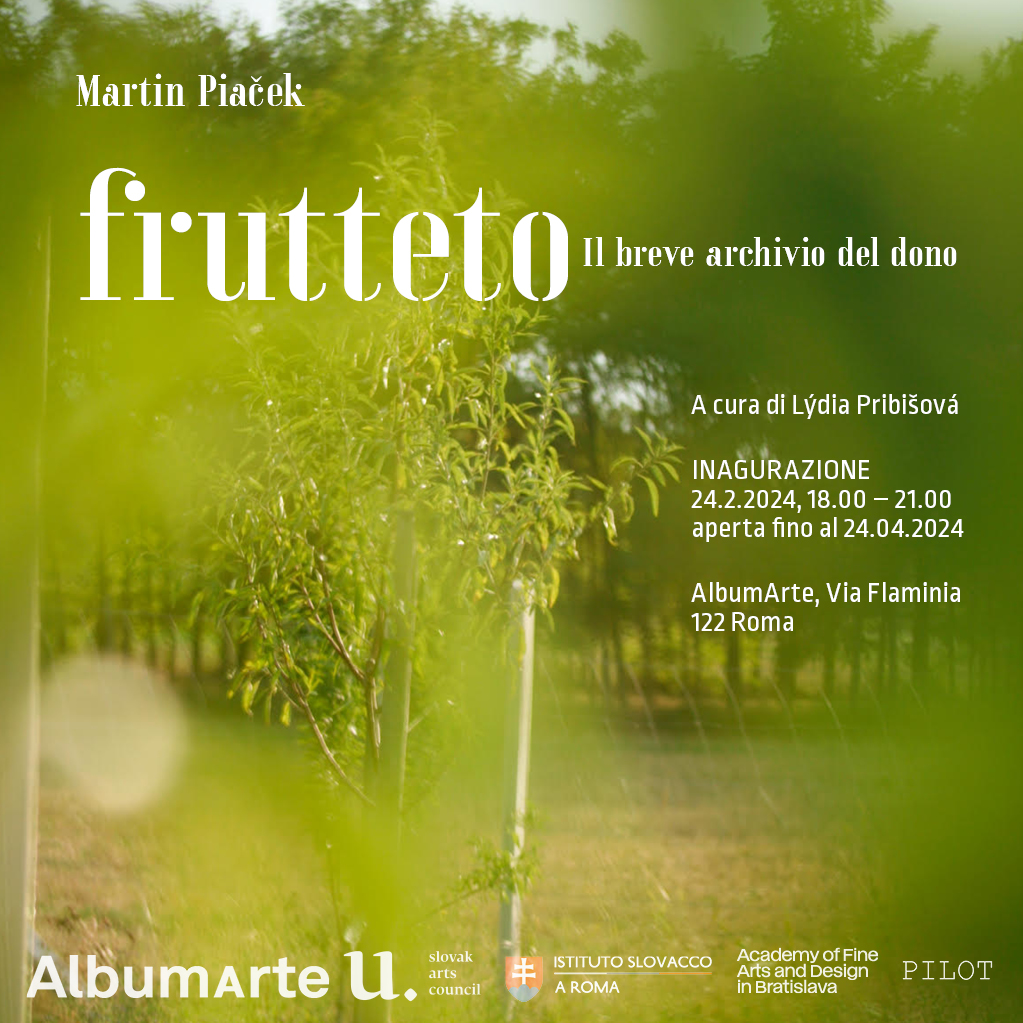ALBUMARTE presents
Martin Piaček
Orchard. Brief Archive of the Gift.
Solo exhibition and site-specific installation
Curated by Lýdia Pribišová
FEBRUARY 24 – APRIL 24, 2024
OPENING
SATURDAY, FEBRUARY 24, 2024 H: 6 P.M. – 9 P.M.
Free Entrance
HOURS: Wednesday, Thursday and Friday 3 p.m. – 7 p.m.
AlbumArte Via Flaminia 122 Rome
Exhibition realized with the support of public funds from the Slovak Art Council, Academy of Fine Arts in Bratislava, Slovak Institute in Rome, in collaboration with PILOT (Bratislava) and AlbumArte.
Curator of the Slovak Pavilion at the 60th Venice Biennale at the end of April, Lýdia Pribišová, curates her sixth project at AlbumArte, involving one of the most interesting protagonists of the Slovak art scene Martin Piaček (Bratislava 1972) and producing the artist’s first solo exhibition in Italy, entitled Orchard. Brief Gift Archive.
Martin Piaček is known primarily as a sculptor who works with the themes of history, heroes, changing national identities, and contradictions in historical narratives. Through these profound themes, he confronts the collective memory with his personal one. Within the exhibition at AlbumArte, however, he focuses on another distinct line of his work, one linked to his long-standing interest in gardening and landscaping.
“In 2017, Martin Piaček founded an orchard in the village of Rajka that he sees as a “different” space, as a productive metaphor for human interactions with time, and as a tool for creative encounters between people, nature, and art. He understands the orchard as an existential, aesthetic, and political activity of (creating) difference. He regards the orchard as a “heterotopia”, capable of uniting a multitude of contradictory endeavours. It is a place that combines production with leisure, utility with beauty, work with contemplation, landscaping with donation, physical effort with aesthetic pleasure, and parasites with harvest, and promotes interpersonal connections, as well as human connections with other, non-human, forms of life. The orchard creates a network of dynamic life situations that take place in real time. It is a space of temporalities and perpetuities, of permeability and flux, of the planned and the indeterminate. Plant time, however, is different from human time. Trees grow slowly, the long-living walnut tree begins to bear fruit after 10–15 years. Hence the artist’s melancholy, his feeling of the impossibility of achieving the desired goal: the orchard will only be fully productive in his old age. Based on these contradictions, the orchard is full of microcosmic potential; it gradually becomes an analytical site that not only represents a different perception of vegetation during our own time, but is a barometer of the landscape’s changing social and cultural environment. This offers a fertile ground for imagining alternative realities. The orchard in Rajka is a model study that the artist has transferred into the gallery space. He long pondered its structure, creating various drawings working with its plan and morphology. (…)” (L.P.)
The artist harbours a longstanding interest in the traditions of fruit growing and the ecological aspects of land use. As he says, these times need projects like this. We are alienated from the natural world and see it as something to be subjugated and exploited. With its emphasis on the cycles of life and consumption, the orchard project invites us to rethink our relationship with, and responsibility towards, nature. From another perspective, it is a long-term dissolution of the boundaries between reality and representation, challenging us to think about the role of art in the renewal of contemporary space and time.”
Martin Piaček (Bratislava,1972) is an artist and the head of vvv studio at the Intermedia Department of the Academy of Fine Arts and Design in Bratislava.
Trained in sculpture, he works with a broad range of media and strategies, trying to reconsider the traditional sculptural techniques and materials. Although his long term interest lies in individual and collective memory, national heroes and myths, mostly from modern European history, his recent projects open towards a broader environmental focus. In addition to his art and teaching practices he is involved in many curatorial and organizational projects, providing expertise on public space and the politics of monuments. He has been working on the dramaturgy of the Soft Norm lecture series and most recently, the globally oriented Liquid Dogmas project (http://www.liquiddogmas.org). He is a founding member of the civic association Public Pedestal (www.verejnypodstavec.com), the exhibition format DiStO (www.disto.sk) and a supporter of the KU.BA platform (www.kulturnabratislava.sk). His works have been presented as solo shows and within numerous group exhibition in Slovakia and abroad. Recently his projects were presented in East Slovak Gallery in Košice (2020), Art Encounters Biennale Timişoara (2019), Karlín Studios in Prague (2018), Futura Gallery Prague (2017) and Kunsthalle Bratislava (2016) among others.
The project was realized with the support of public funds from:



In collaboration of:


